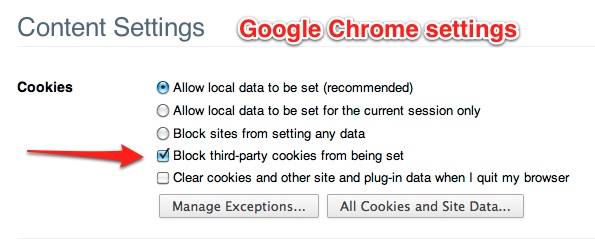Apropos Another Google privacy FAIL (grrr) wherein we discussed Google defeating Safari’s privacy settings to plant ‘third party cookies’ despite my specific instructions to block them … look at the privacy setting in Google Chrome…
Why should we believe them? ‘Unfair and deceptive practices‘ sounds right to me.
“Google has clearly engaged in ‘unfair and deceptive’ practices,” said Consumer Watchdog privacy project director John Simpson, Consumer Watchdog’s Privacy Project director.
“They have been lying about how people can protect their privacy in their instructions about how to opt out of receiving targeted advertising.”
– P
UPDATE Google scams Internet Explorer too. In a different way.
When the IE team heard that Google had bypassed user privacy settings on Safari, we asked ourselves a simple question: is Google circumventing the privacy preferences of Internet Explorer users too? We’ve discovered the answer is yes: Google is employing similar methods to get around the default privacy protections in IE and track IE users with cookies. Below we spell out in more detail what we’ve discovered, as well as recommendations to IE users on how to protect their privacy from Google with the use of IE9’s Tracking Protection feature. We’ve also contacted Google and asked them to commit to honoring P3P privacy settings for users of all browsers.
We’ve found that Google bypasses the P3P Privacy Protection feature in IE. The result is similar to the recent reports of Google’s circumvention of privacy protections in Apple’s Safari Web browser, even though the actual bypass mechanism Google uses is different.
— IE Blog (via John Gruber)



[…] 23, 2012Peter AranyiNo Comments »With all the hullaballoo about internet privacy prompted by Google’s recent actions, I followed a link to Life Hacker’s privacy guide Check it […]
[…] explicit instructions in preferences to ‘block third party cookies’ by ‘unfair and deceptive‘ means (see Another Google privacy FAIL […]